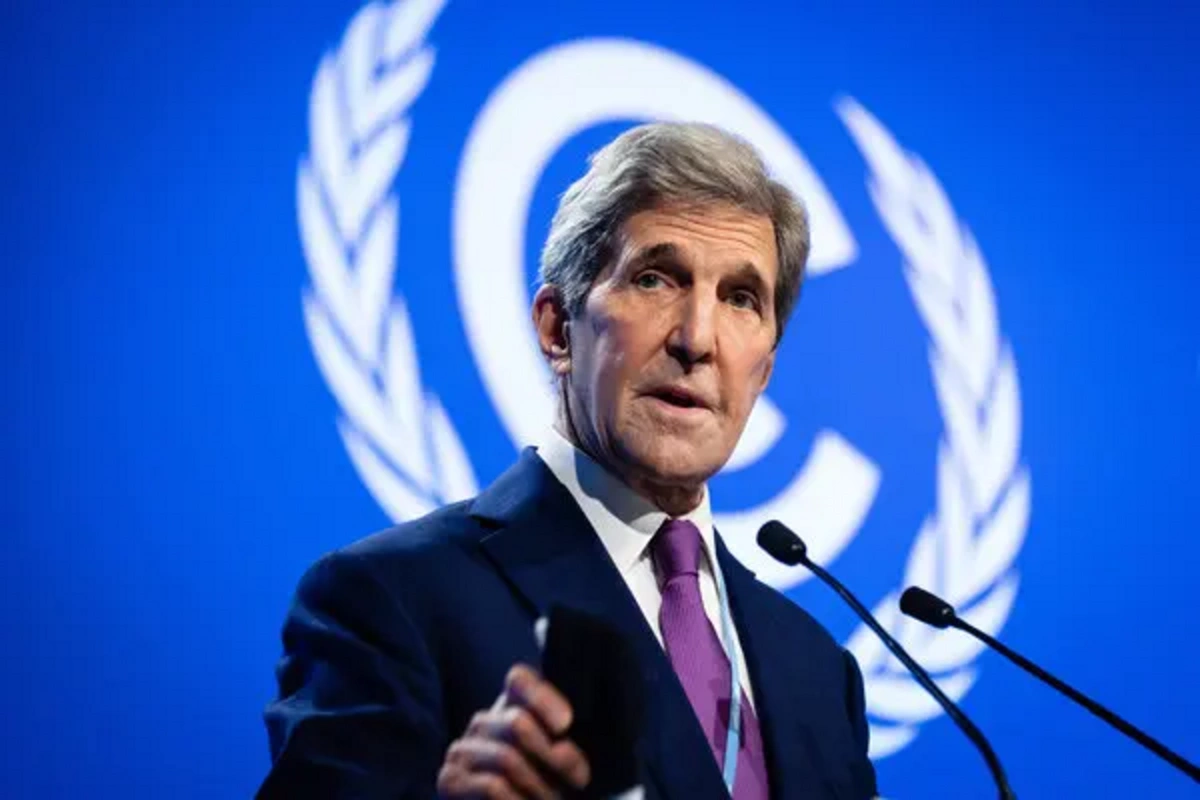
John Kerry at the COP26 United Nations climate summit in Glasgow, Scotland, in 2021.
Appointing a special envoy to the Caspian Sea region would help counter the influence of China, Russia, and Iran, while also dispelling the notion that Washington views the region as an afterthought.
Robert Kaplan once wrote, “The right map can stimulate foresight by providing a spatial view of critical trends in world politics.” The Caspian region provides one such map-one that reveals the growing geopolitical competition among major powers. The late Zbigniew Brzezinski recognized this in his seminal work, The Grand Chessboard (1997)-and its relevance has only intensified since, The Caspian Post reports citing The National Interest.
Today, China is reaching out through Central Asia and across the Caspian to influence Europe. Russia is relying on its treaty allies, Kazakhstan and Kyrgyzstan, to bypass sanctions. A weakened Iran is striving to maintain political and economic relations in the region, as well as collaborating with Moscow to frustrate development among the littoral states of the Caspian Sea.
Yet, U.S. policymaking remains fragmented. Bureaucratic divisions between the State Department, the Pentagon, and the National Security Council hinder strategic coherence. The South Caucasus is a case in point. Armenia’s stated desire to distance itself from its security partner, Russia, and its economic partner, Tehran, remains under-explored. Yerevan, disappointed that Russia failed to come to its aid in its recent war with Azerbaijan, has seen the limits of its security relationship with Moscow. The government and people of Armenia seek greater integration with the European Union-something Moscow has demonstrated that it will resist.
In Georgia, Vladimir Putin is attempting through state capture and election manipulation what he seeks to accomplish in Ukraine through military force: cementing Russian control and thwarting European aspirations. Azerbaijan, the region’s strategic lynchpin and a Shia-majority ally of Israel plays a crucial role in reducing Europe’s dependence on Russian energy.
On the eastern side of the Caspian, the former Soviet republics of Central Asia-grouped within the Bureau of South and Central Asian Affairs-remain an afterthought, overshadowed by U.S. priorities in India and persistent crises in Pakistan and Afghanistan. As a result, American engagement with the Caspian region lacks the clarity, consistency, and senior-level attention that its strategic significance demands.
A special presidential envoy for the Caspian could overcome these artificial bureaucratic barriers, bringing much-needed focus to the region at a time of intensifying competition with China, Russia, and Iran. Such an envoy would also carry far greater weight with regional leaders, who-fairly or not-often view U.S. embassy staff and career diplomats as lacking the influence necessary to shape policy. In the Caspian, heads of state do not prioritize their foreign ministries, preferring to deal with high-level envoys who they see as representing real power. A presidential envoy, speaking directly for the White House, would send a clear message that the United States understands the region’s importance and is committed to engaging at the highest levels.
Too often, U.S. engagement with the region is inconsistent and contradictory. Regional leaders are lectured on democratic change, then reminded about the sanctity of commercial contracts, followed by human rights concerns, and finally pressured to address issues “critical” to a neighboring country that Washington deems more important than their own interests. While these topics merit diplomatic attention, the cumulative effect is confusion and frustration. Caspian leaders see little coherence in U.S. policy and rarely receive sustained senior-level engagement unless Washington needs something from them. This sporadic attention fosters an environment where grand promises of reform are made but seldom fulfilled, and American influence erodes as a result.
Meanwhile, Russia, China, and Iran exploit their geographic advantages to strengthen regional ties. Leaders from the Caspian states meet with Presidents Xi Jinping, Vladimir Putin, and Masoud Pezeshkian far more frequently than with any U.S. president. When Washington does engage, it is often through ambassadors who struggle to gain access to heads of state-even in the capitals where they are posted. A special envoy would change this dynamic. By consistently representing U.S. interests at regional summits and high-level meetings, an envoy would secure the kind of access and influence that career diplomats and mid-level officials cannot.
A dedicated envoy for the Caspian region would be a vital tool in countering China’s growing influence over transit corridors, Iran’s efforts to obstruct energy development, and Russia’s attempts to maintain its privileged sphere of influence. It would also signal to regional leaders that the United States is serious about strengthening partnerships in this strategically crucial part of the world. The Caspian is too important to be an afterthought in U.S. foreign policy. A special envoy would ensure it isn’t.
Share on social media